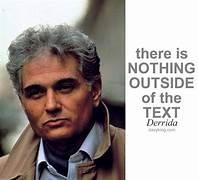SEM - 3 Literary Theory and Criticism: Derrida and Deconstruction.
Flipped Learning : Derrida and Deconstruction
This blog post is part of a flipped learning exercise focused on the deconstruction theory developed by Jacques Derrida (1930-2004). Here, I will address some questions based on the short videos we watched as part of our flipped learning approach.
Flipped Learning means students learn new topics on their own before class, so class time is for active discussions and applying what they learned.
Destabilizing Binary Oppositions: Deconstruction challenges fixed dualities like presence/absence or speech/writing.
Unpacking Language: It involves scrutinizing how language constructs meaning and influences thought.
Multiplicity of Interpretations: Deconstruction reveals multiple, often conflicting interpretations within texts and contexts
1.2 Is Deconstruction a negative term?
Critical Analysis: Deconstruction involves examining texts to reveal hidden assumptions and contradictions.
Constructive Potential: It opens up new possibilities for interpretation and understanding.
Challenge to Authority: It questions established meanings and structures.
Philosophical Neutrality: Deconstruction is a neutral methodological tool, not inherently negative.
Misunderstandings: It is sometimes perceived as destructive due to misunderstandings, but its aim is to deepen understanding.
1.3. • How does Deconstruction happen on its own?
Deconstruction does not happen on its own; it is an active process carried out by a reader or analyst.
Here’s how it works: Textual Engagement: The reader engages deeply with a text, paying close attention to its language, structure, and underlying assumptions.
Identifying Contradictions: The reader identifies contradictions, ambiguities, and tensions within the text.
Questioning Binary Oppositions: Deconstruction involves questioning binary oppositions (such as good/evil, male/female) that the text relies on, showing how these binaries are unstable and interdependent.
Revealing Multiple Meanings: The process uncovers multiple, often conflicting meanings within the text, demonstrating that meaning is not fixed or singular.
2.1The influence of Heideggar on Derrida
Heidegger's influence on Derrida led to a reevaluation of Western philosophy's foundations, focusing on ontology and the role of language in shaping meaning and thought.
2.2Derridian rethinking of the foundations of Western philosophy
Derrida's rethinking of Western philosophy's foundations centers on deconstructing traditional binary oppositions, questioning the stability of meanings, and emphasizing the role of language in constructing reality and truth.
3.1Ferdinand de Saussureian Concept of Language:
Saussure posited that meaning in language is arbitrary, relational, and constitutive, meaning that words derive their meaning from their differences with other words rather than any inherent connection to the objects they represent.
3.2 How Derrida Deconstructs the Idea of Arbitrariness:
3.2 How Derrida Deconstructs the Idea of Arbitrariness:
Derrida deconstructs arbitrariness by showing that what Saussure describes as arbitrary is actually structured by hierarchical oppositions and systems of meaning. He reveals how seemingly arbitrary distinctions between words are imbued with cultural, historical, and philosophical implications.
3.3 Concept of Metaphysics of Presence:
3.3 Concept of Metaphysics of Presence:
Derrida critiques the metaphysics of presence, which privileges presence and immediacy over absence and mediation. He argues that Western philosophy has historically favored the presence of stable meanings and truths, while marginalizing the role of absence, difference, and temporality in language and thought.
4.1Derridian Concept of DifferAnce:
Derrida coined "DifferAnce" by combining "to differ" (to be different) and "to defer" (to postpone). It signifies the dual movement in language where meanings both differ from each other and are deferred or postponed in their fixedness, leading to an endless play of interpretations and significations.
4.2 Infinite Play of Meaning:
4.2 Infinite Play of Meaning:
Derrida argues that language allows for an infinite play of meanings due to the constant deferral of fixed meanings. This concept challenges the notion that meanings are stable and singular, suggesting instead that they are contingent, contextual, and subject to continual reinterpretation and recontextualization.
This statement underscores Derrida's idea that language is not a neutral medium for expressing ideas but is deeply implicated in shaping thought and meaning. Since language structures our understanding of reality, it inherently carries the tools for questioning and deconstructing itself. This necessity of self-critique within language reveals its limitations, biases, and the arbitrary nature of signification, thus opening up possibilities for new interpretations and meanings.
DIfferAnce = to differ + to defer
Derrida combines both the term to differ and to defer, because both words used to convey same meaning which is difference.
5.1 Structure, Sign and Play in the Discourse of the Human Sciences
"Structure, Sign, and Play in the Discourse of the Human Sciences" is a paper by Derrida, presented at Johns Hopkins University, which critiques the work of Claude Lévi-Strauss.
This statement underscores Derrida's idea that language is not a neutral medium for expressing ideas but is deeply implicated in shaping thought and meaning. Since language structures our understanding of reality, it inherently carries the tools for questioning and deconstructing itself. This necessity of self-critique within language reveals its limitations, biases, and the arbitrary nature of signification, thus opening up possibilities for new interpretations and meanings.
6.1 ) The Yale School: the hub of the practitioners of Deconstruction in the literary theories
the characteristics of the Yale School of Deconstruction
The Yale School of Deconstruction emphasizes the multiplicity of meanings in texts and critiques traditional historical and aesthetic approaches to literature, often engaging with Romanticism in its analyses.
How other schools like New Historicism, Cultural Materialism, Feminism, Marxism and Postcolonial theorists used Deconstruction?
1. New Historicism
Deconstruction helps New Historicism reveal the constructed nature of historical narratives and the complex intertextuality between literature and history.
2. Cultural Materialism
Cultural Materialism uses deconstruction to expose ideological contradictions in texts, highlighting the interplay between cultural works and power structures.
3. Feminism
Feminist theorists employ deconstruction to challenge binary gender roles and uncover patriarchal biases in language and texts.
4.Marxism
Marxist theorists use deconstruction to reveal capitalist ideologies in literature and to highlight hidden class struggles within texts.
5. Postcolonial Theory
Deconstruction aids postcolonial theory in analyzing colonial discourse, uncovering power dynamics, and exploring hybrid postcolonial identities


Comments
Post a Comment